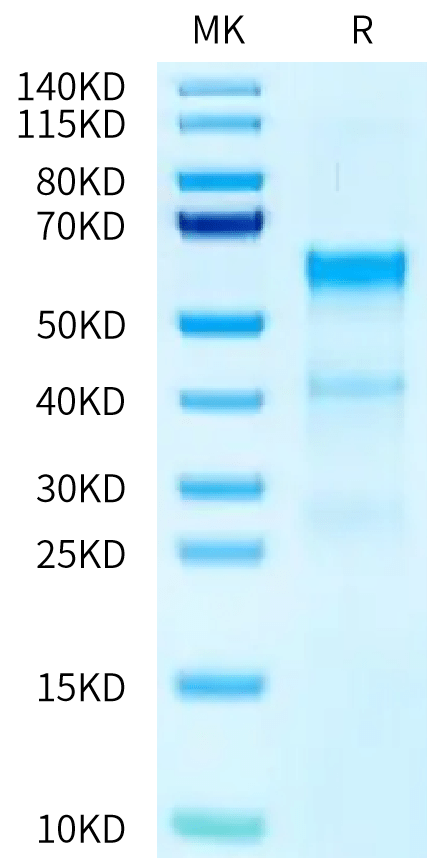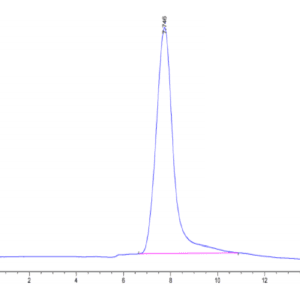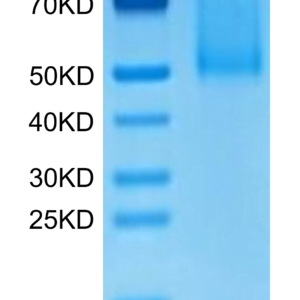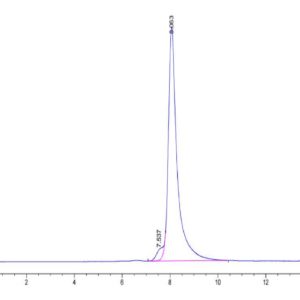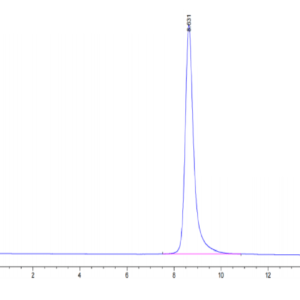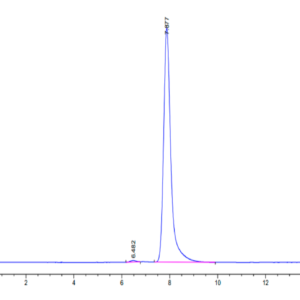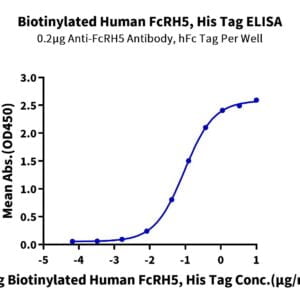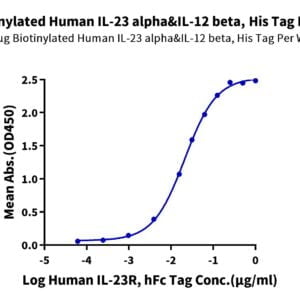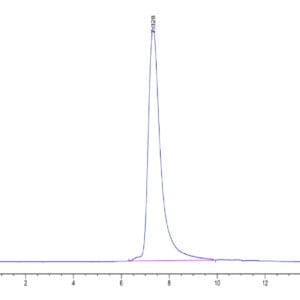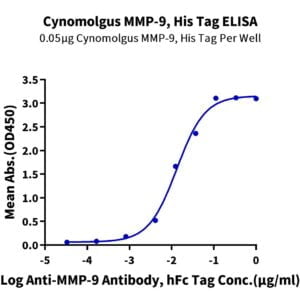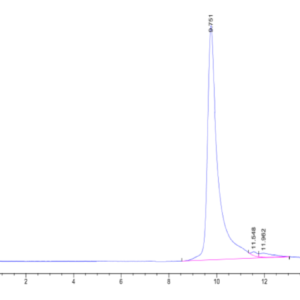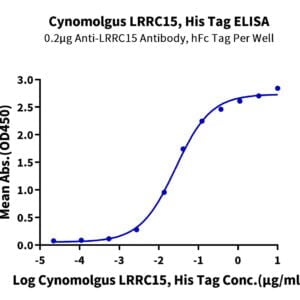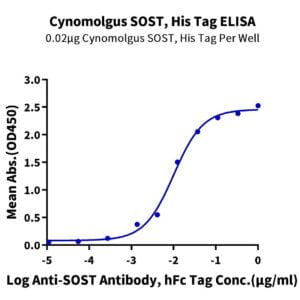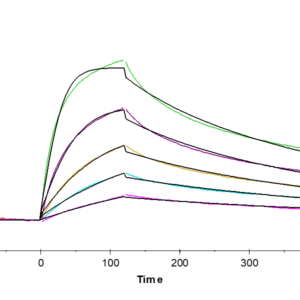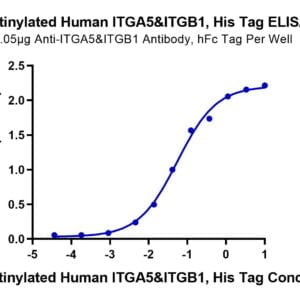| Weight | 1 lbs |
|---|---|
| Dimensions | 9 × 5 × 2 in |
| accession | Q9NT68 |
| express system | HEK293 |
| product tag | N-His |
| purity | > 90% as determined by Tris-Bis PAGE |
| background | Teneurin-2 is a member of a novel family of transmembrane proteins characterized to date in fish, birds, mammals, and Drosophila (e.g., the pair-rule gene product Ten-m). Teneurin-2, a vertebrate homologue of the Drosophila pair-rule gene ten-m/odz, is revealed to be a membrane-bound transcription regulator. In the nucleus, the intracellular domain of teneurin-2 colocalizes with promyelocytic leukemia (PML) protein in nuclear bodies implicated in transcription control. |
| molecular weight | The protein has a predicted MW of 48.48 kDa. The protein cleaved to 55-65 kDa, 38-43 kDa and 25-30 kDa based on Tris-Bis PAGE result. |
| available size | 100 µg, 500 µg |
| endotoxin | Less than 1EU per μg by the LAL method. |
Human TENM2 Protein 2877
$315.00 – $1,050.00
Summary
- Expression: HEK293
- Pure: Yes (SDS-PAGE)
- Amino Acid Range: Gly401-Asn841
Human TENM2 Protein 2877
| protein |
|---|
| Size and concentration 100, 500µg and lyophilized |
| Form Lyophilized |
| Storage Instructions Valid for 12 months from date of receipt when stored at -80°C. Recommend to aliquot the protein into smaller quantities for optimal storage. Please minimize freeze-thaw cycles. |
| Storage buffer Shipped at ambient temperature. |
| Purity > 95% as determined by Tris-Bis PAGE |
| target relevance |
|---|
| Teneurin-2 is a member of a novel family of transmembrane proteins characterized to date in fish, birds, mammals, and Drosophila (e.g., the pair-rule gene product Ten-m). Teneurin-2, a vertebrate homologue of the Drosophila pair-rule gene ten-m/odz, is revealed to be a membrane-bound transcription regulator. In the nucleus, the intracellular domain of teneurin-2 colocalizes with promyelocytic leukemia (PML) protein in nuclear bodies implicated in transcription control. |
| Protein names Teneurin-2 (Ten-2) (Protein Odd Oz/ten-m homolog 2) (Tenascin-M2) (Ten-m2) (Teneurin transmembrane protein 2) [Cleaved into: Ten-2, soluble form; Ten-2 intracellular domain (Ten-2 ICD)] |
| Gene names TENM2,TENM2 KIAA1127 ODZ2 TNM2 |
| Protein family Tenascin family, Teneurin subfamily |
| Mass 9606Da |
| Function Involved in neural development, regulating the establishment of proper connectivity within the nervous system. Promotes the formation of filopodia and enlarged growth cone in neuronal cells. Induces homophilic cell-cell adhesion (By similarity). May function as a cellular signal transducer.; [Isoform 2]: Acts as a ligand of the ADGRL1 receptor. Mediates axon guidance and heterophilic cell-cell adhesion.; [Ten-2 intracellular domain]: Induces gene transcription inhibition. |
| Catalytic activity #N/A |
| Subellular location Cell membrane ; Single-pass membrane protein. Endoplasmic reticulum. Golgi apparatus. Synapse. Cell projection, dendritic spine. Cell projection, filopodium. Cell projection, growth cone. Postsynaptic cell membrane ; Single-pass membrane protein. Synapse, synaptosome. Note=Colocalizes with ADGRL1 across intercellular junctions.; [Isoform 2]: Cell membrane. Note=Colocalizes with ADGRL1 across intercellular junctions.; [Ten-2 intracellular domain]: Nucleus, PML body . |
| Tissues Highly expressed in heart, followed by brain, liver, kidney and fetal brain and weakly expressed in lung and testis. No expression was detected in skeletal muscle, pancreas, spleen, ovary and fetal liver. |
| Structure Homodimer; disulfide-linked (Probable). Heterodimer with either TENM1 or TENM3. May also form heterodimer with TENM4 (By similarity). Isoform 2 (C-terminal globular domain) interacts with ADGRL1 isoform 2. |
| Post-translational modification [Ten-2, soluble form]: Derives from the membrane form by proteolytic processing.; [Ten-2 intracellular domain]: Derives from the plasma membrane form by proteolytic cleavage and translocates to the nucleus. Homophilic binding of the C-terminal extracellular domain stimulates its proteolytic cleavage and release in the cytoplasmic. Is subjected to rapid degradation by the proteasome pathway (By similarity). |
| Domain EG |
| Target Relevance information above includes information from UniProt accession: Q9NT68 |
| The UniProt Consortium |
Publications
Publications
| pmid | title | authors | citation |
|---|---|---|---|
| We haven't added any publications to our database yet. | |||
Protocols
| relevant to this product |
|---|
Documents
| # | ||
|---|---|---|
| Please enter your product and batch number here to retrieve product datasheet, SDS, and QC information. | ||
